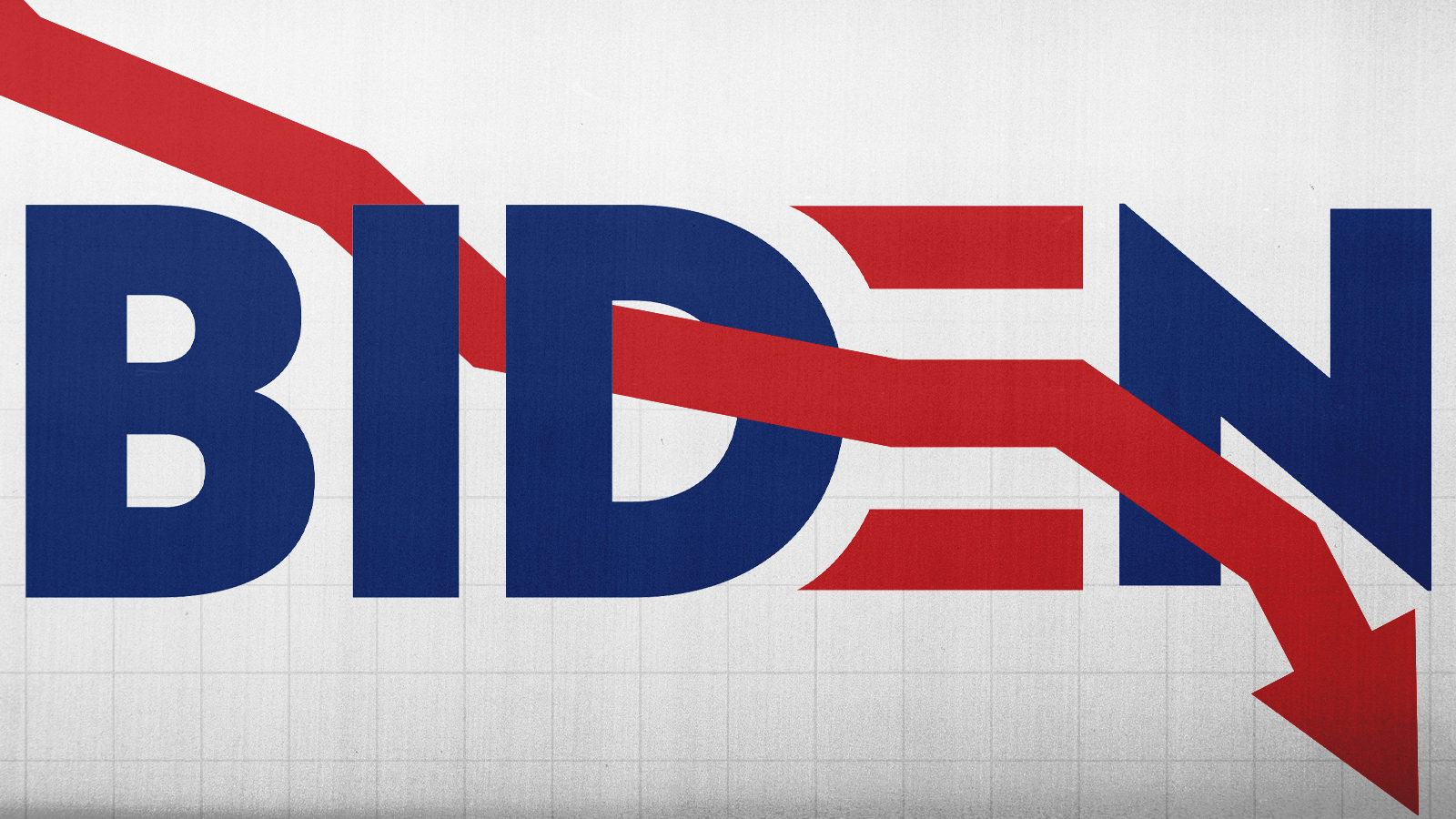Biden enters a politically perilous phase
How low can his polls go?


A free daily email with the biggest news stories of the day – and the best features from TheWeek.com
You are now subscribed
Your newsletter sign-up was successful
How low will he go?
That's the question those watching President Biden's aggregate approval rating have been pondering since early August.
For the entirety of Biden's first several months in office, from January through early June, he remained above 52 percent. Then, in mid-June, he bottomed out to around 51 percent before rebounding. There was a similar trough in mid-July followed by an identical recovery. But then, at the end of July, came the cliff. First 51 percent. Then 50 percent. Then, just as the Afghan government and military collapsed in mid-August, came 49, 48, 47, 46, and his current approval rating of 45 percent.
The Week
Escape your echo chamber. Get the facts behind the news, plus analysis from multiple perspectives.

Sign up for The Week's Free Newsletters
From our morning news briefing to a weekly Good News Newsletter, get the best of The Week delivered directly to your inbox.
From our morning news briefing to a weekly Good News Newsletter, get the best of The Week delivered directly to your inbox.
How worried should Democrats be? If the midterm elections of 2022 were coming up later this month, panic would be perfectly reasonable. But of course the midterms are more than a year away — several eternities in today's hyper-accelerated news cycle. For all we know, Biden could bounce back, collapse, and recover several more times by then.
Yet there are other reasons for Democratic concern — reasons deeply embedded in the structure of our polarized politics and the legislative choices the president has made in the first six months of his presidency.
Everything depends on where Biden's polling floor turns out to be — and we don't yet know. He's been dropping consistently and steadily for weeks now. Will he level out where he currently is, in the mid 40s? Or will he fall further, coming to rest in the low 40s, where Trump spent most of his presidency (at least after his first, unprecedentedly dismal year in the high 30s)? Or could Biden go lower still?
In a recent short column, my colleague Samuel Goldman reflected on Biden's sinking support and concluded that, in a polarized age, weak approval is "normal." That's because it's hard for presidents to sustain majority support with close to half the country primed to disapprove of the person inhabiting the White House no matter what he does. But if that's true, the opposite should be as well: A core of supporters from the president's own party should stick by his side through thick and thin out of naked partisanship, providing him with a pretty solid floor.
A free daily email with the biggest news stories of the day – and the best features from TheWeek.com
If that's really the case, one would expect to see relatively low approval numbers that float within a fairly narrow range. And that is indeed what we've seen since 2009. Barack Obama came into office with a surge of good will and approval ratings well above 60 percent. But that came to an end around 140 days into his presidency and never returned. By 230 or so days in — where Biden is now — Obama was in the low 50s and heading south on a slow glide that would continue on until he hit 45 percent midway through in his second year, a few months before the devastating midterm election of 2010, when Democrats presided over the largest loss of seats in Congress since 1948.
Biden is already that low now, about a year before Obama was.
Could Biden's slide continue? If we bracket the first few months of Obama's temporarily high approval and a last-minute surge up to 54 percent during the shambolic Trump transition, the 44th president bounced around in a 10-point range between the low 50s and low 40s over the course of his eight years in office. If Biden follows that trajectory, it could put his floor at around the same anemic but hardly catastrophic 42 percent.
But can we really say that will be the bottom? As recently as 2007 and 2008, George W. Bush languished in the low 30s, well below Trump's low of 36.5 percent, and ended his presidency in the mid 20s. That was in the midst of the financial crisis, which followed the slow-bleed in an interminable Iraq war, the Katrina debacle, and other evidence of administrative incompetence. After all of that, Bush found himself abandoned not just by Democrats but also by independents and even some Republicans.
Is Biden in danger of that happening? So far, his decline is mostly a function of independents deserting him. What would it take for Democrats to start jumping ship?
Continued news reports showing chaos and oppression in Afghanistan might do it. A terrorist attack emanating from there certainly would. And so might an extension of the COVID-19 pandemic through the fall, winter, and spring, along with mask mandates, travel restrictions, school closings, and confusing and contradictory proclamations from the CDC, FDA, and other government agencies. A slowing economy (or a crash) is also always a threat, particularly with inflation rising, job growth underperforming expectations last month, and the Federal Reserve expected to reduce some of its economic support later this year or early next.
And then there are the two gargantuan infrastructure bills working their way through Congress.
Passing them both in anything like their anticipated form (one focused on hard infrastructure and costing about $1 trillion and another much larger one that greatly expands social and environmental programs and costs $3.5 trillion) was always going to be a heavy lift. But with Biden sagging in the polls? That adds another, layer of difficulty.
The reason why passing the bills was always going to be a challenge is of course that Democratic margins in Congress are extremely narrow, with no room for error, and the party's progressive and moderate wings disagree on a lot. With the head of the party commanding strong public support and working hard to get the bills passed, the prospects for passage would be decent. But with his support sinking? That's a situation primed to expose fissures in the party, with each faction fearing electoral consequences in November 2022 more than it dreads the wrath of an enervated White House.
In that case, one would expect to see both the left-wing and moderate factions of the party doing whatever they can to prevail but willing to go down fighting rather than compromise and alienate voters they will need to be energized on Election Day 2022. If the bills go down to defeat, at least each faction will be able to say to its base, "I did everything I could, and I never gave up fighting for what's right."
A Biden who presides over such a debacle will look enfeebled, with dangerous political consequences — much as Bill Clinton's early effort to pass health-care reform crashed and burned, setting up historical Republican gains in the 1994 midterm elections.
This implies that Biden would be better off with the two bills passing, since that would give him a solid legislative victory. Yet that is far from clear. If the bills pass in anything like their current form, moderates will likely face an angry electorate next year. But if the bills are scaled back before passage, progressives could face a backlash in their own deep blue districts. If you doubt that Democrats can be punished for their accomplishments, recall that the party's devastating losses of 2010 took place after (and in direct reaction to) their passage of the Affordable Care Act.
If this makes it sound as if there's no winning for Joe Biden, that's because his presidency has entered a politically perilous phase. But that doesn't mean he's doomed. Good news on the economic or epidemiological front could give him a badly needed boost — as could a display of exceptional political skill in negotiations over passage of the infrastructure bills.
But short of that? We could well end up looking back at the late summer of 2021 as just the beginning of the polling free fall.
Damon Linker is a senior correspondent at TheWeek.com. He is also a former contributing editor at The New Republic and the author of The Theocons and The Religious Test.
-
 How the FCC’s ‘equal time’ rule works
How the FCC’s ‘equal time’ rule worksIn the Spotlight The law is at the heart of the Colbert-CBS conflict
-
 What is the endgame in the DHS shutdown?
What is the endgame in the DHS shutdown?Today’s Big Question Democrats want to rein in ICE’s immigration crackdown
-
 ‘Poor time management isn’t just an inconvenience’
‘Poor time management isn’t just an inconvenience’Instant Opinion Opinion, comment and editorials of the day
-
 The ‘mad king’: has Trump finally lost it?
The ‘mad king’: has Trump finally lost it?Talking Point Rambling speeches, wind turbine obsession, and an ‘unhinged’ letter to Norway’s prime minister have caused concern whether the rest of his term is ‘sustainable’
-
 The billionaires’ wealth tax: a catastrophe for California?
The billionaires’ wealth tax: a catastrophe for California?Talking Point Peter Thiel and Larry Page preparing to change state residency
-
 Bari Weiss’ ‘60 Minutes’ scandal is about more than one report
Bari Weiss’ ‘60 Minutes’ scandal is about more than one reportIN THE SPOTLIGHT By blocking an approved segment on a controversial prison holding US deportees in El Salvador, the editor-in-chief of CBS News has become the main story
-
 Memo signals Trump review of 233k refugees
Memo signals Trump review of 233k refugeesSpeed Read The memo also ordered all green card applications for the refugees to be halted
-
 Has Zohran Mamdani shown the Democrats how to win again?
Has Zohran Mamdani shown the Democrats how to win again?Today’s Big Question New York City mayoral election touted as victory for left-wing populists but moderate centrist wins elsewhere present more complex path for Democratic Party
-
 Millions turn out for anti-Trump ‘No Kings’ rallies
Millions turn out for anti-Trump ‘No Kings’ ralliesSpeed Read An estimated 7 million people participated, 2 million more than at the first ‘No Kings’ protest in June
-
 Democrats: Harris and Biden’s blame game
Democrats: Harris and Biden’s blame gameFeature Kamala Harris’ new memoir reveals frustrations over Biden’s reelection bid and her time as vice president
-
 ‘We must empower young athletes with the knowledge to stay safe’
‘We must empower young athletes with the knowledge to stay safe’Instant Opinion Opinion, comment and editorials of the day
